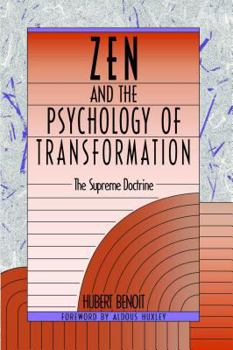Zen and the Psychology of Transformation: The Supreme Doctrine
Select Format
Select Condition 
Book Overview
Man cannot live fully until he has considered the great questions of life. It is for this reason that we turn to Western psychology and metaphysics for help in solving our problems. The approach of psychology and psychotherapy is based on "statistical normality," or the behavior of the greatest number. In an effort to conform, we focus on our problems rather than our possibilities, emulating a norm that falls drastically short of our full capacity...
Format:Paperback
Language:English
ISBN:0892812729
ISBN13:9780892812721
Release Date:March 1990
Publisher:Inner Traditions International
Length:264 Pages
Weight:0.91 lbs.
Dimensions:0.8" x 6.1" x 9.1"
Customer Reviews
5 ratings
May change your life
Published by Thriftbooks.com User , 20 years ago
Benoit is brave to get to the heart of Zen in a way that is not usually done by Chan masters. Excellent translation by someone who knows the stuff, who himself is an authority onthe subject. This book simply tells you how to look at your true nature. That's all. Each chapter is independent of other and approaches this difficult task of looking within from fresh angles. Only problem is that it requires some prerequisite in the subject or at least an honest and deep desire to know who you are.
Excellent stuff, but be prepared
Published by Thriftbooks.com User , 22 years ago
This book attempts to put Zen into the realm of western thinking. It has the right stuff. Unfortunately, it is sometimes very difficult to read and comprehend. Perhaps it is the translation from French, but I found the phrasing, punctuation, and some of the vocabulary very cumbersome. Take a look at the excerpts on this page to see a sample of the style. Nonetheless, this book is a must read for anyone seriously investigating What Is.There are many diamonds here, but you will need a pick and shovel.
Perhaps the profoundest book ever written on Zen
Published by Thriftbooks.com User , 22 years ago
Zen is probably the most radical approach to existence devised through human history. Authentic Zen has nothing New Age or feel-good about it: it promises no comfort or self-aggrandizement, only absolute existential salvation, and THAT only have a laborious emptying out of the cup of ego that runneth over.Most Zen masters refuse to discuss the discipline or explain it. Hubert Benoit takes the opposite, and for intellectually-inclined Westerners, the more accessible path, and discusses Zen in exhaustive detail in terms of psychology and philosophy--especially phenomenology and existentialism. I was skeptical of this approach until I actually read this book. Benoit writes at an extremely high level of abstraction (something quite alien to traditional Zen, which deals mainly in parables) but any experienced meditator will concur that practically every word Benoit writes rings with utter truth and fidelty to the workings of consciousness. He is clearly a man who has absorbed the Zen teachings and then examined the workings of his own mind with unfailing rigor and perceptiveness; he has taken those findings and translated them into language with a care and accuracy that nobody else, to my knowledge, has ever matched. The results are utterly profound.Indispensable for anybody interested in Zen or the expansion of consciousness.
A profound classic!
Published by Thriftbooks.com User , 25 years ago
I have read this book several times over the course of five or so years; a rare occurence for me. The fact that Aldous Huxley writes the foreword should speak volumes in itself. In Huxley's own words this profound classic seeks to break through all that "obstructs the flow of life and grace and inspiration." A challenging read, but I doubt that you would regret having this book in your life. Consider it yeast!
Ancient Zen for the Modern World
Published by Thriftbooks.com User , 25 years ago
Few of us have the opportunity to retreat into an actual monastic way of life for years and years in order to sink into the nature of Zen experience. Therefore, many branches of Zen, with their emphasis on monastic methods, are often somewhat anachronistic amid the modern world of busyness, speed, information, and seemingly continual bombardment from every direction. Hubert Benoit's Zen and the Psychology of Transformation goes back to the impetus of Zen--a philosophy called Chan that derived in China in the 7th century from an illiterate philosopher named Hui Neng--in order to offer a form of Zen that is fully possible in the context of modern life. Chan is not centered in sitting meditation, or in traditional zazen techniques, but rather simply in a restful type of introspection that leads one directly to the core of Zen experience. Benoit details the mechanics of this introspective life in poetic and technical form, and in a way that leaves one with a clear and simple knowledge of how one is to live one's life according to the restful life of Zen.





